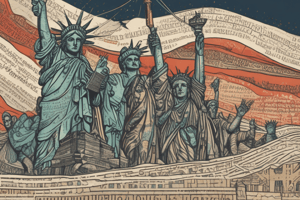Podcast
Questions and Answers
संविधान द्वारा प्रत्येक व्यक्ति को दी गई बुनियादी अधिकारों और स्वतंत्रताओं को क्या कहते हैं?
संविधान द्वारा प्रत्येक व्यक्ति को दी गई बुनियादी अधिकारों और स्वतंत्रताओं को क्या कहते हैं?
- मौलिक अधिकार (correct)
- राजनीतिक अधिकार
- आर्थिक अधिकार
- सामाजिक अधिकार
नागरिक अधिकारों के तहत कौन सा अधिकार आता है?
नागरिक अधिकारों के तहत कौन सा अधिकार आता है?
- सांस्कृतिक अधिकार
- शिक्षा का अधिकार
- जीवन का अधिकार (correct)
- मतदान का अधिकार
मौलिक अधिकारों की कौन सी विशेषता है?
मौलिक अधिकारों की कौन सी विशेषता है?
- सार्वभौम (correct)
- प्रमाणित
- अविभाज्य
- न्यायसंगत
सरकार मौलिक अधिकारों पर क्यों प्रतिबंध लगा सकती है?
सरकार मौलिक अधिकारों पर क्यों प्रतिबंध लगा सकती है?
मौलिक अधिकारों के उल्लंघन की स्थिति में क्या किया जा सकता है?
मौलिक अधिकारों के उल्लंघन की स्थिति में क्या किया जा सकता है?
मौलिक अधिकारों की सुरक्षा और प्रवर्तन के लिए कौन सा संवैधानिक प्रावधान है?
मौलिक अधिकारों की सुरक्षा और प्रवर्तन के लिए कौन सा संवैधानिक प्रावधान है?
मौलिक अधिकारों का कौन सा पक्ष सबसे ज्यादा महत्वपूर्ण है?
मौलिक अधिकारों का कौन सा पक्ष सबसे ज्यादा महत्वपूर्ण है?
मौलिक अधिकारों के संबंध में क्या कहा जा सकता है?
मौलिक अधिकारों के संबंध में क्या कहा जा सकता है?
मौलिक अधिकारों के उल्लंघन के मामले में कौन सी संस्था हस्तक्षेप कर सकती है?
मौलिक अधिकारों के उल्लंघन के मामले में कौन सी संस्था हस्तक्षेप कर सकती है?
Flashcards are hidden until you start studying
Study Notes
Definition and Importance
- Fundamental rights are a set of basic rights and freedoms guaranteed to every individual by the constitution of a country.
- These rights are essential for the development and protection of individuals and are considered essential for human dignity.
Classification of Fundamental Rights
- Civil Rights: protect individual liberty and freedom from government interference (e.g., right to life, freedom of speech, freedom of movement)
- Political Rights: enable citizens to participate in the political process (e.g., right to vote, right to stand for election)
- Economic and Social Rights: ensure access to basic necessities like education, healthcare, and a decent standard of living (e.g., right to education, right to work)
- Cultural and Collective Rights: protect the rights of groups and communities (e.g., right to practice one's religion, right to preserve cultural heritage)
Characteristics of Fundamental Rights
- Universal: apply to all citizens regardless of race, gender, religion, or social status
- Inalienable: cannot be taken away by the government or any other authority
- Non-derogable: cannot be suspended or limited, even in times of emergency
- Enforceable: can be enforced through legal action or court proceedings
Limitations and Restrictions on Fundamental Rights
- Reasonable restrictions: government may impose limitations on fundamental rights to protect public interest, national security, or morality
- Proportionality: any restrictions must be proportionate to the aim they seek to achieve
- Judicial review: courts can review and strike down unconstitutional restrictions on fundamental rights
Protection and Enforcement of Fundamental Rights
- Constitutional provisions: fundamental rights are enshrined in the constitution and protected by the judiciary
- Legal remedies: individuals can seek legal remedies, such as writs and lawsuits, to enforce their fundamental rights
- Human rights commissions: independent bodies that investigate and address violations of fundamental rights
मौलिक अधिकारों की परिभाषा और महत्व
- किसी देश के संविधान द्वारा प्रत्येक व्यक्ति को दिए गए基本 अधिकार और स्वतंत्रताएं मौलिक अधिकार हैं।
- ये अधिकार व्यक्ति के विकास और संरक्षण के लिए आवश्यक हैं और मानव गरिमा के लिए आवश्यक माने जाते हैं।
मौलिक अधिकारों का वर्गीकरण
- नागरिक अधिकार: सरकारी हस्तक्षेप से व्यक्ति की स्वतंत्रता की रक्षा करते हैं (जैसे जीवन का अधिकार, विचार की स्वतंत्रता, गति की स्वतंत्रता)
- राजनीतिक अधिकार: नागरिकों को राजनीतिक प्रक्रिया में भाग लेने की अनुमति देते हैं (जैसे वोट देने का अधिकार, चुनाव लड़ने का अधिकार)
- आर्थिक और सामाजिक अधिकार: बुनियादी जरूरतें पूरी करने के लिए आवश्यक हैं (जैसे शिक्षा का अधिकार, काम का अधिकार)
- सांस्कृतिक और सामूहिक अधिकार: समूहों और समुदायों के अधिकारों की रक्षा करते हैं (जैसे अपना धर्म पालने का अधिकार, सांस्कृतिक विरासत की रक्षा का अधिकार)
मौलिक अधिकारों की विशेषताएं
- सार्वभौमिक: सभी नागरिकों के लिए लागू होते हैं, चाहे वह किसी भी जाति, लिंग, धर्म या सामाजिक स्थिति से संबंधित हो
- अपरिहार्य: सरकार या किसी अन्य अधिकारी द्वारा इन अधिकारों को वापस नहीं लिया जा सकता
- अपवर्जनीय: जब भी आवश्यकता हो, इन अधिकारों को सीमित या निलंबित नहीं किया जा सकता
- न्यायिक प्रवर्तनीय: इन अधिकारों का उल्लंघन होने पर न्यायिक कार्यवाही द्वारा इन्हें लागू किया जा सकता है
मौलिक अधिकारों पर प्रतिबंध और सीमाएं
- संवैधानिक प्रतिबंध: सरकार द्वारा सार्वजनिक हित, राष्ट्रीय सुरक्षा या नैतिकता के लिए मौलिक अधिकारों पर प्रतिबंध लगाया जा सकता है
- अनुपातिकता: कोई भी प्रतिबंध अपने उद्देश्य के अनुपात में होना चाहिए
- न्यायिक समीक्षा: न्यायालय द्वारा असंवैधानिक प्रतिबंधों की समीक्षा की जा सकती है और उन्हें रद्द किया जा सकता है
मौलिक अधिकारों का संरक्षण और प्रवर्तन
- संवैधानिक प्रावधान: मौलिक अधिकार संविधान में निहित हैं और न्यायपालिका द्वारा संरक्षित हैं
- कानूनी उपाय: व्यक्ति मौलिक अधिकारों के उल्लंघन के लिए कानूनी उपाय कर सकते हैं, जैसे रिट और मुकदमे
- मानवाधिकार आयोग: स्वतंत्र निकाय जो मौलिक अधिकारों के उल्लंघन की जांच और समाधान करता है
Studying That Suits You
Use AI to generate personalized quizzes and flashcards to suit your learning preferences.




